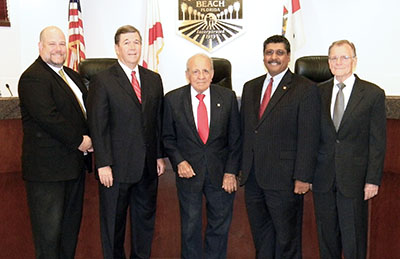In a 3-2 decision, the Royal Palm Beach Village Council approved a referendum last week that will ask voters to increase council members’ terms from two to three years. The referendum will take place next March.
At the June 5 council meeting, Village Manager Ray Liggins said the village charter sets the terms of office for council members and the mayor at two years, and that a referendum is required to change the length of the terms.
“The Village Clerk’s Office received survey information for 31 of 38 municipalities in Palm Beach County regarding term lengths, limits and election frequency,” Liggins said.
The results showed that 48.5 percent of the 31 cities have two-year terms, the same proportion have three-year terms for the council and 3 percent have four-year terms. For mayor, 42 percent had two-year terms, 50 percent had three-year terms and 8 percent had four-year terms.
Fifty-two percent of the municipalities that responded have annual elections, with 13 percent having elections every other year, and 32 percent having elections for two years with the third year off. The majority — 77 percent — did not have term limits.
“Whatever we change, whether it be term lengths or term limits, it would require a referendum,” Liggins said. “Referendum questions cannot be placed on the November ballot, according to the supervisor of elections, unless there is a compelling reason to do that. If the council chose to make any changes to our election, it would be placed on the March ballot and we could make it effective immediately for terms going from that point forward, not that point backward. No existing terms would be modified, only terms from that election going forward.”
During public comment, Felicia Matula, a two-time unsuccessful candidate for mayor, noted that Wellington is the only municipality with four-year terms, but that is coupled with an eight-year term limit.
“At this point, I think the village would be remiss if you solely address term lengths and left the term limits out,” Matula said.
She also asked the council to consider moving elections from March to November, when there is a larger voter turnout.
Mayor Matty Mattioli also read a half-dozen cards and e-mails supporting extended terms tied with term limits. Several also favored moving elections from March to November.
Village Attorney Jennifer Ashton noted that most local elections are held in March.
Councilman Fred Pinto asked Ashton about changing the election date. She answered that it could be changed from March to November by ordinance without a referendum.
Pinto said he’d been thinking about term lengths for several years.
“Every year, we have this scurrying of an election, notwithstanding of what it costs to do that,” he said. “It’s the cost to our public and to our community. Going through an election cycle year after year, there’s a psychological impact on the officeholders, and what I’ve seen happen is there have been times when… certain elected officials are driven because they’re going through an election cycle as opposed to doing something because it’s the right thing to do for the citizens.”
Pinto said he would prefer to have elections every other year and would prefer three-year terms rather than four.
Ashton said the rotation for council seats would have to be rearranged in order to get one year on and one year off, otherwise three-year terms would still require elections two out of every three years.
Pinto said he would favor putting the question of three-year terms to the voters. He added that he might prefer November balloting in order to have a larger voter turnout.
Vice Mayor Dave Swift said he thought the council discussing term lengths seemed self-serving. “To me, the way it’s done in most cities comes from the community,” Swift said.
He pointed out that some years, a sitting council member does not draw a challenger.
“I’ve served here for more than 20 years, and there was a long stable period when I didn’t have anybody challenging me,” Swift said.
He added that he did not favor term limits. “If we had term limits, we would not have had Mayor David Lodwick for as long as we did,” Swift said.
On the other hand, he said, it might not be a bad thing to take a year off and come back the next year and run for a different seat. “It’s not that bad,” Swift said. “I’m getting more sympathetic to the term limit thing. If it really wants to happen, it needs to come from the public, not from us.”
Councilman Jeff Hmara agreed with Swift’s comments. “I really do think it needs to come from the public,” Hmara said, explaining that he didn’t want the council to seem self-serving. “This is a healthy thing to talk about, but I really think it should come from the public.”
Councilman Richard Valuntas said he did not agree with term limits but had no problem with asking voters if they favor three-year terms. “I don’t think it’s a good idea to preclude people from serving the village,” he said.
However, Valuntas added that he believes two-year terms keep council members more responsive to the electorate and that the price of the elections — approximately $30,000 each — is just “the cost of doing business.”
He also opposed changing the election to November because local elections are overshadowed by the often long state and national ballot.
Mattioli said he did not object to having a referendum for three-year terms, but he pointed out that when a previous charter revision committee was discussing two-year or three-year terms years ago, it got out of hand and the police had to be called.
“I think it’s a good idea, but beware,” Mattioli said.
Pinto made a motion to place the question of three-year terms on the next municipal ballot, but not term limits. Pinto’s motion carried 3-2, with Hmara and Swift opposed.








